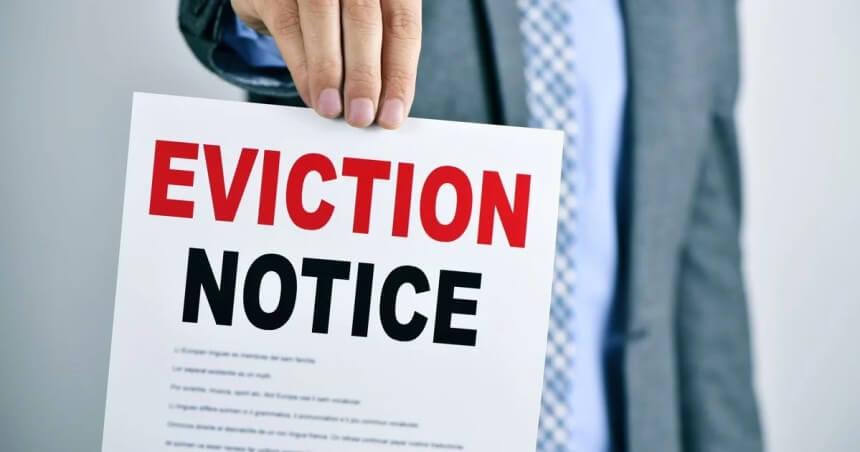How To Evict Tenant Lawfully In Abuja
goldandlandsadmin November 1, 2022 No Comments

Different countries have different eviction laws, and Nigeria as a country has its eviction laws and processes each landowner in each state in the country must follow.
As a property owner in Abuja, you must duly follow the law when evicting tenants from your property. It is an offense punishable by law for a property owner to evict a tenant from his property forcibly.
There are laid down rules and steps to follow when evicting a tenant; the most used methods of changing the locks, packing the tenant’s properties out, removing some of the roofing sheets, or using armed forces services or thugs are illegal. These are actions are punishable by the law if the tenant decides to file a case against you for damages, wrongful eviction, and trespass.
As a property owner, you can only rightfully evict a tenant from your property and proceed with the eviction process against a tenant based on the following;
● If the tenant fails to pay the rent despite several demands, notifications, and a late rent notice to the tenant.
● When the tenant makes use of the leased property for illegal purposes or in an immoral way, such as robbing, prostitution, drug housing, etc.
● Lack of proper maintenance of property by the tenant.
● If the landlord desires to have a structural repair of the property.
● If the tenant causes damages to the leased property.
● If the tenant Interferes or tramples on the property owner’s rights, other tenants or neighbors.
● Sublet of property to 3rd party when not indicated in the tenancy agreement
● Abandonment of leased property by the tenant.
● If the property owner deems the property unsafe to live in and a threat to life.
● If the property owner desire to use the leased property.
● Violation of tenancy agreement by the tenant.
● If the tenant is constituting a nuisance or inconveniencing other tenants or neighbors.
● If the tenant carries out unapproved structural repairs to the property, i.e. breaking walls without the landlord’s consent.
Read Also: What Is Abuja Nigeria Landlord And Tenant Rights?
These above-listed circumstances are the approved circumstances a tenant must have violated (any of them) before a landlord can lawfully evict them from his property. To rightfully evict a tenant from your property, the most important step to follow is to provide the said tenant with an “Eviction Notice.”
The Process of Evicting a Tenant In Abuja
Here is the due process to follow when evicting a tenant in your property in Abuja, to avoid being on the wrong side of the law.
Step One: Late Rent Notice
This step is only needed for tenants owning rent. Find out if the tenant you want to evict owes rent; if they do, you can serve them a Late Rent Notice. Under the law guiding the state, you can decide to seek an order to recover unpaid rent payment or seek an order of possession. To seek an order for the payment of due rent, you only need to provide evidence of rent default by the tenant to the court.
Step Two: Notice to Quit
After issuing a late rent notice, and you still wish to proceed with the eviction of the tenant, you can issue a Notice to Quit to the tenant. A Notice to Quit is the formal legal document a landlord sends a tenant asking the tenant to vacate the property on or before a particular date.
Note that you can issue a Notice to Quit if the tenant is not on a fixed lease or the lease is expired, Notice to Quit is recommended for tenants on a periodic lease. In a periodic lease, the period of the lease is stated and agreed upon in the tenancy agreement.
● If the agreement period is a year, the property owner is required to issue a six months notice to the tenant (This is more like a period of grace for the tenant to pack out).
● If the agreement period is quarterly or half-year, the property owner is required to issue a minimum of three months’ notice to the tenant.
● If the agreement period is monthly, the property owner is required to issue a monthly notice.
● If the period of the agreement is weekly, the property owner is required to issue at least a week’s Notice to Quit.
Step Three: Owner’s Intention to Recover Possession
After serving a late rent notice and a notice to quit, if the tenant refuses to adhere to the request. You can proceed to issue a seven days owner’s intention to recover leased possession to the tenant.
Step Four: Court
You will present the issue to the court upon issuance of the owner’s intention to recover possession. The court process involved you providing witnesses and evidence to support non-payment of rent or other vices you want to evict the tenant on.
After considering your evidence, if you duly followed the steps mentioned above, the judge can deliver a judgment ordering the tenant to vacate the property immediately or give them a specified date to move out.
In Conclusion
Note that by the law, only the court bailiff is lawfully allowed to physically or forcefully remove a tenant from a property by order of the court. The law does not permit you as the property owner or property agent to remove an unwilling tenant from his property; there is due process to be followed when evicting a tenant from your property.
The harsh truth is you can not decide to evict a tenant from your property without following the due steps despite how long the tenant has lived in your property without paying rent. To avoid being sued by the tenant and being found guilty by the court, follow the due eviction process.



